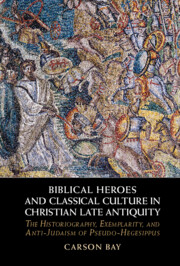This article argues that the first-century Jewish historian, Titus Flavius Josephus, was of central importance to early American Protestants as they wrestled with how to construct a divinely upheld polity and with who would be included within it. By tracing the prefaces to the many editions of Josephus that were published in the eighteenth and nineteenth centuries, it becomes clear that many Protestant readers in America felt torn between two competing identities: Rome and Israel. Scholars of early America are familiar with both labels. But as many early Americans knew from Josephus, those images were not always complementary. In fact, as they pondered over the account of the decimation of the first Jerusalem at the hands of Rome, it became clear that there might be something antithetical in those ancient models. This article argues that Josephus's histories enabled Americans to hold together the tensions in their national identity and ancient imagination that envisioned the United States as both a new Rome and a New Jerusalem. As a foundation, Josephus breathed life and legitimacy into the developing American culture. By neglecting to account for Josephus in this era, scholars have overlooked one of the most pervasive stories that formed the character and understanding of American Protestantism.
